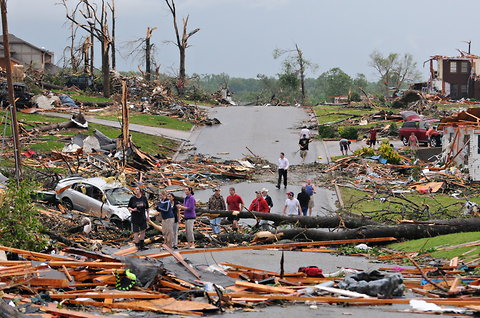 Associated PressThe aftermath of the Joplin, Mo., tornado in May 2011.
Associated PressThe aftermath of the Joplin, Mo., tornado in May 2011.
An article in this week’s Your Money special section takes a look on what residents in Joplin, Missouri learned about disaster-proofing your financial life, from the tornado that devastated their community in May 2011.
Many of the lessons sound simple. Renter’s insurance is a good idea. So is a fireproof box containing important documents and some cash. Prepare a list of your medications and specific dosages, so you can replace them.
To that list, I can add a few of my own. As a journalist, I’ve covered natural disasters, but was never directly affected by one until an ice storm struck my town in January 2009. It can’t compare to the Joplin tornado or Hurricane Sandy, but the ice storm knocked out power for days. My husband was traveling so I was alone with our two young children. I huddled with them under blankets, trying to stay warm while persuading them that we were playing Laura Ingalls Wilder in her book, “The Long Winter.” We cringed at the shotgun-like sound of branches snapping from the weight of the ice. Tree limbs crashed through our roof and through a large plate glass window, terrifying the children and letting in the icy cold.
Here are a few lessons I learned.
1. It helps to have good neighbors. Although we had just moved into our home weeks earlier, neighbors showed up with a tarp to cover our shattered window and offered temporary lodging.
2. Spend money to stock up on nonperishable food items. When bad weather was initially forecast, I thought, “snow” — and loaded up the refrigerator, on the theory that I didn’t want to drive in a blizzard. Turns out that ice storms are much worse than plain old snow when it comes to downed power lines. Most of that food spoiled.
4. File your insurance claim as soon as you can and take digital pictures of the damage. I recall that our claim for repair of our roof and windows was handled promptly and fairly, but having the photos helped.
5. If it’s safe to leave and you can afford temporary quarters, don’t try to tough it out. When it became clear that the situation was going to drag on, we bailed and drove (very, very slowly) to a hotel that had power. A warm bed and a hot breakfast did wonders for our spirits.
What are your emergency tips, whether from Hurricane Sandy or some other natural disaster?
Article source: http://bucks.blogs.nytimes.com/2012/11/15/tips-for-disaster-planning/?partner=rss&emc=rss
